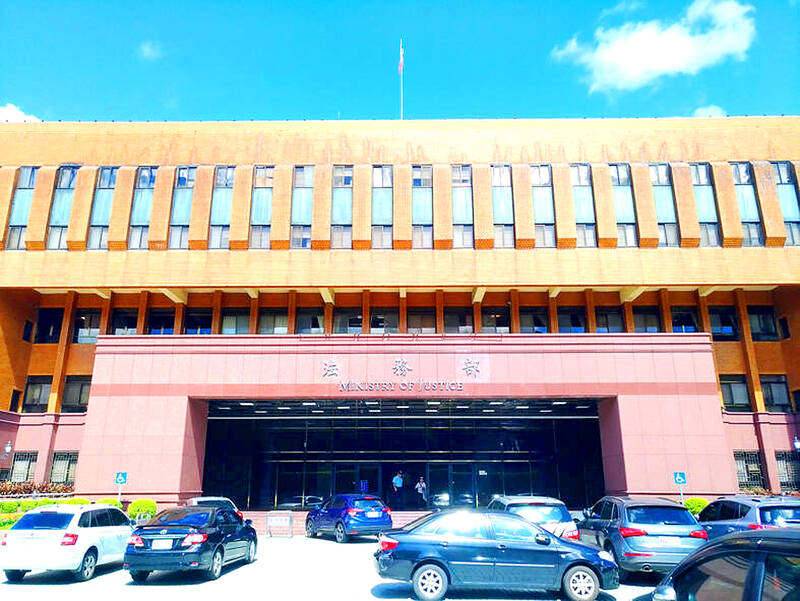The Ministry of Justice on Friday denied accusations that it was unwilling to carry out death sentences, saying that all 37 inmates on death row in Taiwan are in the process of applying for legal remedies.
The prisoners have brought their cases to the Constitutional Court and have therefore received a legally guaranteed stay of execution, the ministry said in a statement.
Chinese Nationalist Party (KMT) vice presidential candidate and Broadcasting Corp of China chairman Jaw Shaw-kong (趙少康) criticized the governing Democratic Progressive Party (DPP) earlier this week, saying it was neither trying to abolish capital punishment nor daring to carry out executions.

Photo: Wu Cheng-feng, Taipei Times
Two people have been put to death under capital punishment laws since the DPP was elected into office in May 2016.
In response, the ministry said the implementation of the death penalty could only be immediate if the remedy process were eliminated, but doing so might contravene Taiwan’s legal system.
Taiwan has written two UN human rights-related covenants into domestic law — namely the International Covenant on Civil and Political Rights (ICCPR) and the International Covenant on Economic, Social and Cultural Rights (ICESCR).
Taiwan’s presidential candidates discussed the death penalty in a televised debate last week, with only the KMT’s presidential candidate, New Taipei City Mayor Hou You-yi (侯友宜), clearly stating his opposition to abolishing capital punishment.
DPP presidential candidate Vice President William Lai (賴清德) said it was a sensitive issue in any country and that abolishing it requires a high degree of public support.
While neither the ICCPR nor the ICESCR requires abolishing the death penalty, they do call for extra discretion in deciding whether to carry out executions, Lai said.
The ICESCR does not mention the death penalty.
The ICCPR says it “may be imposed only for the most serious crimes in accordance with the law” and can only be carried out “pursuant to a final judgment rendered by a competent court.”
Meanwhile, Taiwan People’s Party Chairman and presidential candidate Ko Wen-je (柯文哲) said that given the global trend away from capital punishment, the only compromise he could think of was to not allow parole for people who have been sentenced to life imprisonment.

Taiwan has received more than US$70 million in royalties as of the end of last year from developing the F-16V jet as countries worldwide purchase or upgrade to this popular model, government and military officials said on Saturday. Taiwan funded the development of the F-16V jet and ended up the sole investor as other countries withdrew from the program. Now the F-16V is increasingly popular and countries must pay Taiwan a percentage in royalties when they purchase new F-16V aircraft or upgrade older F-16 models. The next five years are expected to be the peak for these royalties, with Taiwan potentially earning

POSITIVE DEVELOPMENT: Japan and the US are expected to hold in-depth discussions on Taiwan-related issues during the meeting next month, Japanese sources said The holding of a Japan-US leaders’ meeting ahead of US President Donald Trump’s visit to China is positive news for Taiwan, former Japan-Taiwan Exchange Association representative Hiroyasu Izumi said yesterday. After the Liberal Democratic Party’s landslide victory in Japan’s House of Representatives election, Japanese Prime Minister Sanae Takaichi is scheduled to visit the US next month, where she is to meet with Trump ahead of the US president’s planned visit to China from March 31 to April 2 for a meeting with Chinese President Xi Jinping (習近平). Japan and the US are expected to hold in-depth discussions on Taiwan-related issues during the

‘LIKE-MINDED PARTNER’: Tako van Popta said it would be inappropriate to delay signing the deal with Taiwan because of China, adding he would promote the issue Canadian senators have stressed Taiwan’s importance for international trade and expressed enthusiasm for ensuring the Taiwan-Canada trade cooperation framework agreement is implemented this year. Representative to Canada Harry Tseng (曾厚仁) in an interview with the Central News Agency (CNA) said he was increasingly uneasy about Ottawa’s delays in signing the agreement, especially as Ottawa has warmed toward Beijing. There are “no negotiations left. Not only [is it] initialed, we have three versions of the text ready: English, French and Mandarin,” Tseng said. “That tells you how close we are to the final signature.” Tseng said that he hoped Canadian Prime Minister Mark Carney

STAY IN YOUR LANE: As the US and Israel attack Iran, the ministry has warned China not to overstep by including Taiwanese citizens in its evacuation orders The Ministry of Foreign Affairs (MOFA) yesterday rebuked a statement by China’s embassy in Israel that it would evacuate Taiwanese holders of Chinese travel documents from Israel amid the latter’s escalating conflict with Iran. Tensions have risen across the Middle East in the wake of US and Israeli airstrikes on Iran beginning Saturday. China subsequently issued an evacuation notice for its citizens. In a news release, the Chinese embassy in Israel said holders of “Taiwan compatriot permits (台胞證)” issued to Taiwanese nationals by Chinese authorities for travel to China — could register for evacuation to Egypt. In Taipei, the ministry yesterday said Taiwan